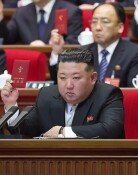Can Brazil Truly Emerge as a Strong Nation?
Can Brazil Truly Emerge as a Strong Nation?
Posted October. 05, 2009 08:20,
After the International Olympic Committee awarded Rio de Janeiro the right to host the 2016 Summer Olympics Saturday, Brazilian President Luiz Inacio Lula da Silva shed tears at a news conference Saturday.
Many say his tears represented Brazils commitment to becoming a truly strong country, but does South Americas largest country have what it takes to be one?
As if pouring cold water on the excitement of Brazilians over winning the bid, Newsweek magazine said Brazil must change its diplomatic policy before 2016 if it wants to be a strong nation.
The magazine criticized Brazils lukewarm attitude in resolving touchy international issues and diplomatic disputes while raising its voice over the expansion of the U.N. Security Council and reform of global financial systems at the U.N. General Assembly and the Group of 20 summit as a country leading global economic growth.
Brazil has expanded its international influence by establishing diplomatic ties with 35 countries over the past six years. Yet many in the international community say the country has failed to boost its national brand despite the quantitative expansion of its influence.
Instead of paying attention to human rights abuses in authoritarian countries such as Sri Lanka, North Korea and Congo, Brazil supports Venezuelan President Hugo Chavez, who has suppressed his countrys media and turned his parliament into a rubber stamp organization.
International human rights organizations say Brazil is capitalizing on its voting rights related to human rights to win the support from countries that violate human rights. Former Mexican Foreign Minister Jorge Castaneda criticized Brazil for behaving like a dwarf in diplomacy.
Worse, Lula drew international ridicule by calling the bloodshed in Iran in the wake of the alleged rigged election a ruckus by soccer fans of a rival country.
Others say, however, that such criticism can be interpreted as jealousy by advanced economies that failed to win the 2016 Olympics. What is clear is that the hosting of the Olympics will draw more international attention to Brazil than when it became one of the four emerging economies called BRIC (Brazil, Russia, India and China) in 2003.
To overcome such challenges, Brazil needs to show the international community that it also respects universal values. This is why the next seven years is more important to Brazil than the past seven years.
ve r s o @ d o nga .c om







